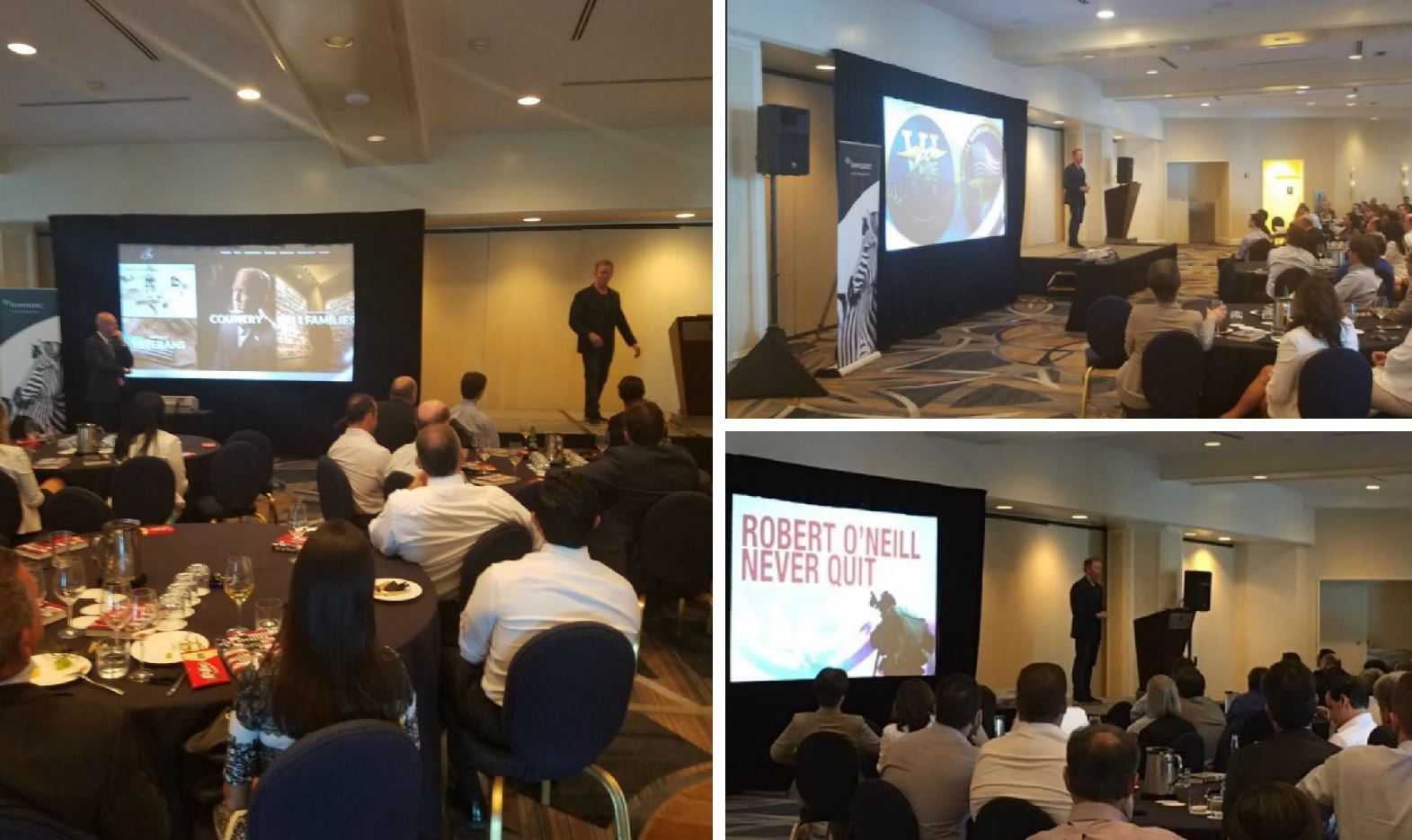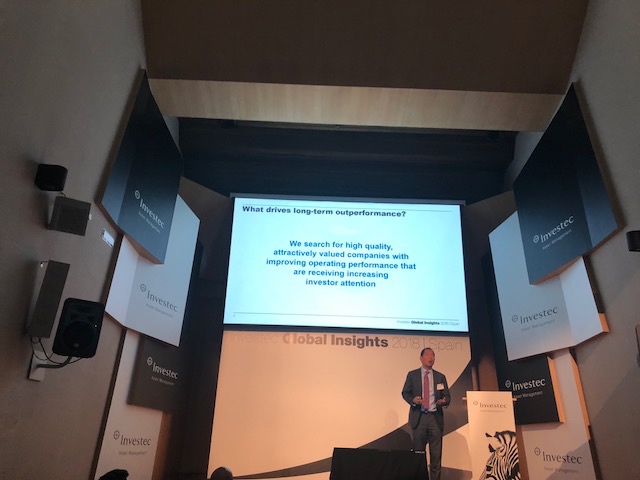Investec Asset Management has many reasons to celebrate. Last month, one of its flagship strategies, the Investec Global Franchise fund, celebrated its tenth anniversary with an excellent performance history, exceeding the MSCI All Companies World Index by 2.9% annually over the last 10 years. Added to this success, is the asset management firm’s extraordinary track record in Miami; and in appreciation, the company will try to hold an annual inspirational event for financial industry professionals.
The first “Investec Inspirational Event” took place in Miami last Thursday, June 15th featuring Robert O’Neill, the Navy SEAL soldier who shot and killed Bin Laden in May 2011. O’Neill, with over 400 missions, 52 medals and 17 years of service in the US military, shared his experiences, and the lessons arising thereof that can be applied in daily life, with a hundred financial advisors.
During his speech, he pointed out the strenuous selection process that he had to overcome to become part of the Navy SEALs: “It is an intensive training, very hard, in which it is very easy to quit, and which even encourages quitting, because there is the option to resign at any time. The army is always trying to increase the number of soldiers entering the Navy SEALs admission tests, but regardless of how many people enroll for this process, 85% don’t make it through.”
According to O’Neill, the main reason why the system works is obviously that each of the instructors is a Navy SEAL and has undergone the same training, which he describes as “not impossible, but very hard, followed by something even more difficult, which is immediately followed by something even harder, day after day, for 8 months.” However, he doesn’t recommend facing a challenge with that mentality, as the key to achieving a long-term goal is to focus on little victories. So, for months, he followed the advice of his first instructor: “Just think of waking up in time, making the bed properly, brushing your teeth and being on time for the 5 am training; afterwards, just worry about getting to breakfast, after that about making it to lunch time, and then about making it to dinner. After dinner, just worry about getting to a perfectly made bed. If the bed is made the right way, no matter how bad the day was, you will only think of the next day. And when you think of quitting, something that will pass through your head, think, ‘I will not abandon now, I will quit tomorrow’. All I am asking you is to do one thing, no matter what, never quit and you will be fine.”
Another important lesson that the Navy SEALs learn by simulating different extreme situations, is that panic will not help them, so they train in keeping calm by negative reinforcement. “All the stress we experience in life is in our head, it is self-induced. It’s a choice we make; it’s a burden we choose to carry. In combat, bravery is not the absence of fear, it is the ability to recognize fear, put it aside, and act. No one has ever achieved anything positive by panicking. Fear is natural, it makes you think with greater clarity, but there is a line that should not be crossed, because panic is contagious. Portray calm, and calm will be contagious.”
Once he became part of this elite army corps, he was deployed to several worldwide destinations until the September 11th attacks in New York. Then everything changed. He decided to enroll in a special unit within the Navy SEALs, where he would have to spend another 9 months in exhaustive training, this time competing against other seasoned Navy SEALs, knowing that 50% of the participants don’t succeed.
Then the secret missions, the truly dangerous ones, began; those in which he went from being a soldier to not existing, and to having to communicate with his children using fake e-mail addresses when entering combat.
At that level, O’Neill points out the need to move from taught tactics to invented tactics, to being creative, to anticpating what the opponent is doing. It is at that moment that the usefulness of micromanagement is questioned, since each member of the team must know how to perform their task. This is achieved by training, adjusting tactics, and learning the best way to communicate effectively.
The Mission that Ended Osama Bin Laden’s Life
The mission was carried out by an incredible intelligence team, led by four women, who after years of searching managed to locate Bin Laden in Pakistan. O’Neill reveals that President Obama was not convinced that this was Bin Laden’s whereabouts, and that the mission was initially set up to check that information and return.
One of the most stressful moments of this operation was the 90-minute flight from the base in Afghanistan to bin Laden’s hideout, during which they could have been hit at any moment for invading the country’s airspace. “Ninety minutes during which your head doesn’t stop thinking: ‘everything can explode now’. Worrying about things you can’t control only adds to pressure. So what do you do? At that point, I started counting from 0 to 1,000 and then in the reverse, from 1,000 to 0, to keep my head free from distractions, speeding up the counting or slowing it down, in order to just not think.
Once they arrived at the destination, one of the helicopters fell without casualties, and the rest of the soldiers entered the house identified as Bin Laden’s hideout. He was able to witness the first steps of the operation from the front line, the rest of the team dispersed to check the rooms. On the last set of stairs, he sensed a movement behind a curtain which he thought could be Osama Bin Laden’s last protective barrier, expecting to find suicide bombers in explosive vests. “At that moment I remember thinking that it was not a matter of bravery, but the tiredness of constantly thinking that I could explode at any moment. I moved the curtain, and there I found him. In front of me was Osama Bin Laden, as tall as I expected, a little thinner, with a somewhat grayer beard.”
O’Neill fired twice and felt paralyzed for a few seconds, and then more officers entered the room, asking if he was okay. Then O’Neill asked what the next step was, to which they responded “to go through the computer systems, we have rehearsed it a thousand times”.
On the return flight, another tense ninety minutes during which no one speaks until their arrival in Afghanistan, at which point the pilot jokes that it is probably the only time they will celebrate being in this country.
To conclude, O’Neill’s suggestion to his audience was: “The next time you feel overwhelmed by the stress at work, when nothing is working out as it should, or when you are at home and feel like the ceiling is falling on your head, breathe deeply and think of all those people who are fighting, defending and preserving freedom. Push yourself forward, never quit, and you will be fine.”

